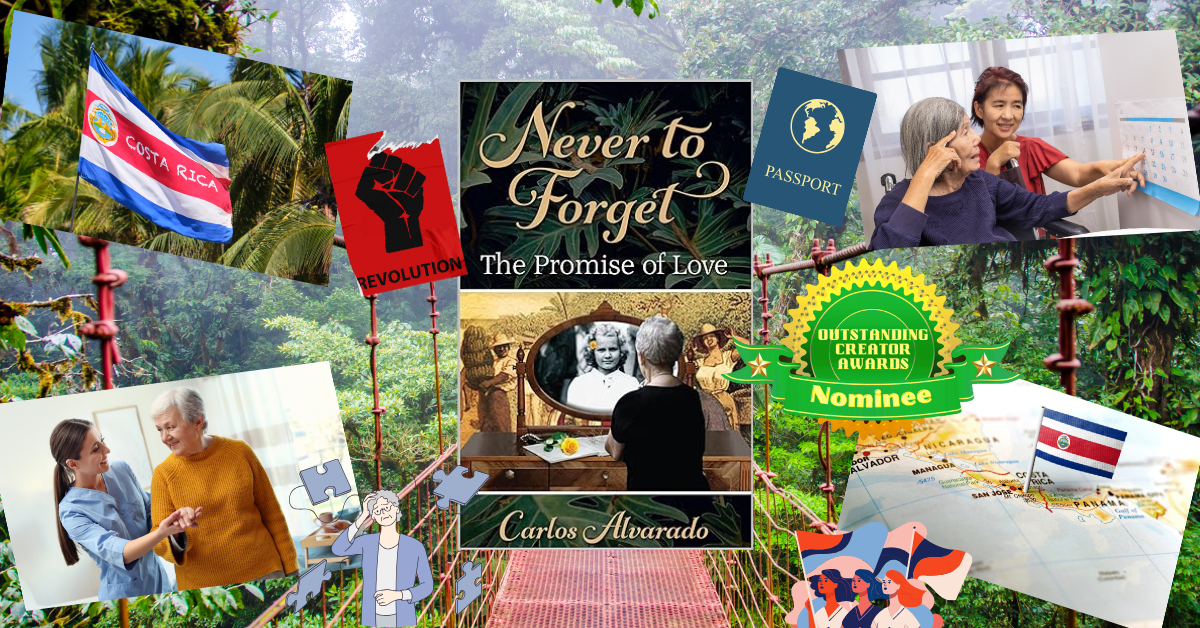|
Score: 93+/100 (9.3+ out of 10)
Never to Forget: The Promise of Love is an outstanding multicultural, historical, pseudo-biographical novel by Carlos Alvarado! This book follows Bertelina “Bertha” Solis, an elderly Hispanic (Tico) woman suffering from dementia and the Alzheimer's that runs in the family (bringing both irony and meaning to the title, Never to Forget). However, it is gradually revealed that Bertha isn't just an elderly woman who is losing her cognition, mind, and memories—she is a significant yet relatively-unsung part of history, not just of her family but of her country and her people. In a sense, Bertha is a living legend—an iron lady in her twilight years. See, Bertha grew up in the 1930s and 1940s. Now, we know what immediately comes to your mind when you think of those decades: World War II, the rise of Fascism in Europe, and possibly the Cold War. Maybe the Arab-Israeli conflict and/or India's independence/partition come to mind. It seems like almost every book that comes our way that's written about the 30s, 40s, and 50s takes place in either North America, Europe, or Asia. However, during all that craziness in the world that get so much more publicity, notoriety, and attention, a little Central American country called Costa Rica was living out its own history—on the verge of a revolution of its own that would explode in 1948. Bertha grew up in the middle of that all, a beautiful girl in a tense, strictly-Catholic and conservative society that seemed like it was being held together by duck tape—a powder keg ready to blow. In this book, you really get a sense of the oppressive atmosphere that Bertha lived under. No, it's not so much that the government is totalitarian (well, you could still argue that), it's that Costa Rican society itself seemed so rigid and strict, especially when it came to the actions, behaviors, choices, and even the clothing of girls and women. For one, girls were often married off (as a sort of arranged marriage) to the benefit of their families. For another, the women were denied the right to vote, according to this book, which contributed to the tension leading to upheaval and conflict. This is a society that, at the time, championed and echoed the sentiment that “What a woman desires is always expendable.” There's a real, strong sense of Bertha and her fellow Ticos (Costa Rican people) being controlled: controlled politically, socially, culturally, and even religiously. You really get a strong sense of the zealous religious conviction and, some would say, superstition that permeated the society of the time. For example, the characters constantly refer to the Catholic saints. Furthermore, there is an almost ubiquitous, perpetual presence of the image of the Virgin of Guadalupe which follows the characters like Big Brother in 1984 or a Che Guevara picture. However, her image serves a dual-purpose. Though she can be seen as another ever-present, ever watchful authority figure like the corrupt, power-hungry politicians, she is also a woman—a woman like Bertha. In a sense, she is an inspiration to Bertha and the other Tico women in the story to strive for freedom, autonomy, and independence. She seems to inspire them to be an intercessor in the face of absolute power: to tell the government that they won't remain silent and will not be controlled anymore. It's so interesting to read a book like this after just reading A Path of Possession by Charles LaBrasseur, a fantasy novel that featured a very religious and superstitious society that seemed to be leaning into hysteria, a hysteria that was about to tear their society apart. It's ironic to see so many similarities between that fantastical/made-up society and Costa Rica of the 20th century. Bertha became a voice for change, often taking part in protests and even being given opportunities to speak/represent the cause at events. She rubbed shoulders with some of the leaders, both militarily and politically, of the revolutionary movement, demonstrating that being female doesn't exclude you from being involved and making a difference. However, this book not only follows Bertha during the revolution, but also her life afterward. In particular, Bertha endured a tenuous relationship with Owen, the father of her children. The ups and downs of their relationship make up a rather significant portion of this book, especially since they seem to serve as lessons for Maria (Bertha's daughter), who is on a journey of her own to find love and romance. Maria, who also presents most of the information in this book in the form of a biography, learns from Bertha and Owen what not to do and how love should really work. Bertha's life had other wild twists and turns, such as a brief yet tragic stint as an actress in telenovellas, and—perhaps biggest of all—coming to reside in California in the USA. Later sections of this book concern Bertha's struggles in adapting to this new world, its new language, and this new way of life. Most notable of all, Bertha is forced to reconcile her old country—which only got a constitution later in her life as a result of the revolution—with that of America—the world's oldest constitutional democracy. She is constantly on guard for the wrongs and injustices in America that remind her of things that she lived through. This book is a beautiful tale about how we are never truly gone and will never be forgotten. All the things we've done and all the things we've lived through have consequences that reverberate long after we've lost our minds and our lives. Check it out on Amazon!
0 Comments
Leave a Reply. |
Archives
July 2024
Categories |

 RSS Feed
RSS Feed